COIT 20246 Assignment: Analysis of IT Service, VLSI, and IoT
VerifiedAdded on 2023/04/22
|13
|4399
|486
Homework Assignment
AI Summary
This homework assignment for COIT 20246 requires students to research and summarize various IT-related topics. The assignment covers a range of subjects, including Very Large Scale Integration (VLSI) technology and its future applications, the potential of blockchain operating systems, on-demand computing services provided by companies like IBM, the features of Layer 2 protocols like Token Ring, and the application of the Internet of Things (IoT) in healthcare. Each task involves finding and summarizing a resource, providing a title, reference, and a detailed summary of approximately 200-300 words. The assignment emphasizes the importance of using original words, proper citation using the Harvard format, and avoiding direct copying from sources. The tasks are designed to cover different aspects of IT infrastructure and emerging technologies, requiring students to analyze and synthesize information from various sources. The assignment aims to enhance students' understanding of current IT trends and their practical applications in different sectors. Students will learn about the use of VLSI technology, blockchain operating systems, on-demand computing, Ethernet, and the Internet of Things (IoT) in healthcare. The assignment emphasizes the importance of using original words, proper citation using the Harvard format, and avoiding direct copying from sources.
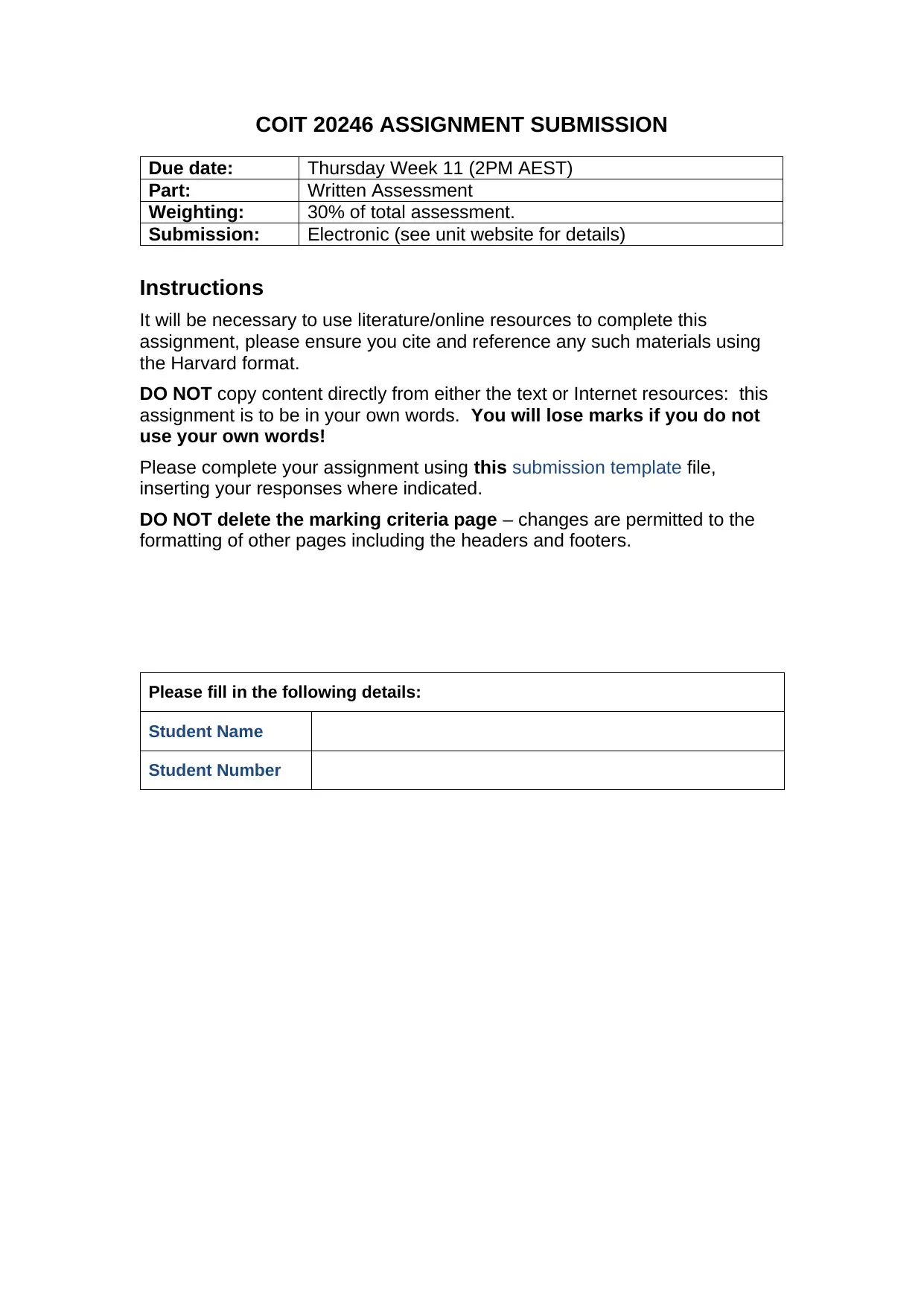
COIT 20246 ASSIGNMENT SUBMISSION
Due date: Thursday Week 11 (2PM AEST)
Part: Written Assessment
Weighting: 30% of total assessment.
Submission: Electronic (see unit website for details)
Instructions
It will be necessary to use literature/online resources to complete this
assignment, please ensure you cite and reference any such materials using
the Harvard format.
DO NOT copy content directly from either the text or Internet resources: this
assignment is to be in your own words. You will lose marks if you do not
use your own words!
Please complete your assignment using this submission template file,
inserting your responses where indicated.
DO NOT delete the marking criteria page – changes are permitted to the
formatting of other pages including the headers and footers.
Please fill in the following details:
Student Name
Student Number
Due date: Thursday Week 11 (2PM AEST)
Part: Written Assessment
Weighting: 30% of total assessment.
Submission: Electronic (see unit website for details)
Instructions
It will be necessary to use literature/online resources to complete this
assignment, please ensure you cite and reference any such materials using
the Harvard format.
DO NOT copy content directly from either the text or Internet resources: this
assignment is to be in your own words. You will lose marks if you do not
use your own words!
Please complete your assignment using this submission template file,
inserting your responses where indicated.
DO NOT delete the marking criteria page – changes are permitted to the
formatting of other pages including the headers and footers.
Please fill in the following details:
Student Name
Student Number
Paraphrase This Document
Need a fresh take? Get an instant paraphrase of this document with our AI Paraphraser
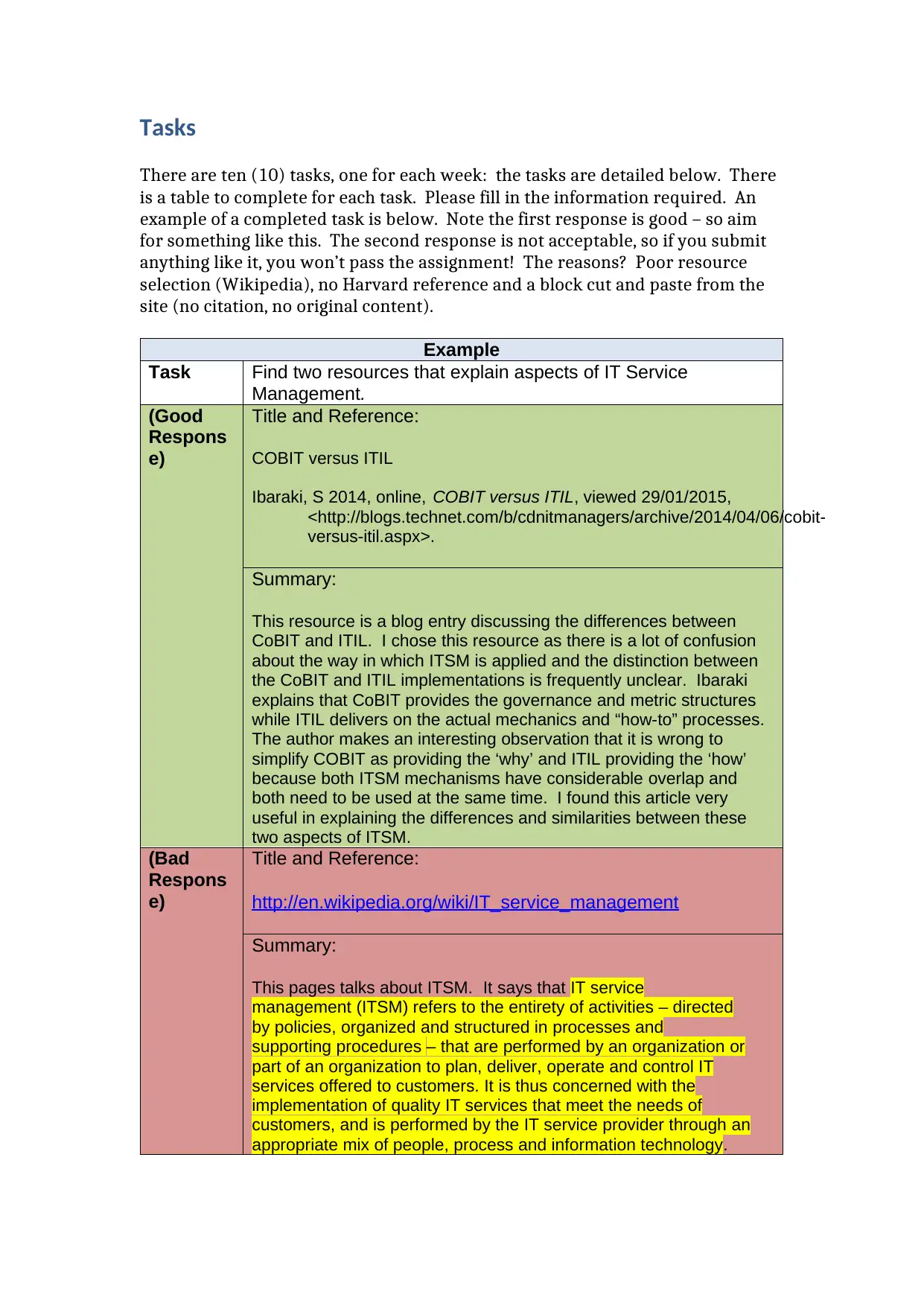
Tasks
There are ten (10) tasks, one for each week: the tasks are detailed below. There
is a table to complete for each task. Please fill in the information required. An
example of a completed task is below. Note the first response is good – so aim
for something like this. The second response is not acceptable, so if you submit
anything like it, you won’t pass the assignment! The reasons? Poor resource
selection (Wikipedia), no Harvard reference and a block cut and paste from the
site (no citation, no original content).
Example
Task Find two resources that explain aspects of IT Service
Management.
(Good
Respons
e)
Title and Reference:
COBIT versus ITIL
Ibaraki, S 2014, online, COBIT versus ITIL, viewed 29/01/2015,
<http://blogs.technet.com/b/cdnitmanagers/archive/2014/04/06/cobit-
versus-itil.aspx>.
Summary:
This resource is a blog entry discussing the differences between
CoBIT and ITIL. I chose this resource as there is a lot of confusion
about the way in which ITSM is applied and the distinction between
the CoBIT and ITIL implementations is frequently unclear. Ibaraki
explains that CoBIT provides the governance and metric structures
while ITIL delivers on the actual mechanics and “how-to” processes.
The author makes an interesting observation that it is wrong to
simplify COBIT as providing the ‘why’ and ITIL providing the ‘how’
because both ITSM mechanisms have considerable overlap and
both need to be used at the same time. I found this article very
useful in explaining the differences and similarities between these
two aspects of ITSM.
(Bad
Respons
e)
Title and Reference:
http://en.wikipedia.org/wiki/IT_service_management
Summary:
This pages talks about ITSM. It says that IT service
management (ITSM) refers to the entirety of activities – directed
by policies, organized and structured in processes and
supporting procedures – that are performed by an organization or
part of an organization to plan, deliver, operate and control IT
services offered to customers. It is thus concerned with the
implementation of quality IT services that meet the needs of
customers, and is performed by the IT service provider through an
appropriate mix of people, process and information technology.
There are ten (10) tasks, one for each week: the tasks are detailed below. There
is a table to complete for each task. Please fill in the information required. An
example of a completed task is below. Note the first response is good – so aim
for something like this. The second response is not acceptable, so if you submit
anything like it, you won’t pass the assignment! The reasons? Poor resource
selection (Wikipedia), no Harvard reference and a block cut and paste from the
site (no citation, no original content).
Example
Task Find two resources that explain aspects of IT Service
Management.
(Good
Respons
e)
Title and Reference:
COBIT versus ITIL
Ibaraki, S 2014, online, COBIT versus ITIL, viewed 29/01/2015,
<http://blogs.technet.com/b/cdnitmanagers/archive/2014/04/06/cobit-
versus-itil.aspx>.
Summary:
This resource is a blog entry discussing the differences between
CoBIT and ITIL. I chose this resource as there is a lot of confusion
about the way in which ITSM is applied and the distinction between
the CoBIT and ITIL implementations is frequently unclear. Ibaraki
explains that CoBIT provides the governance and metric structures
while ITIL delivers on the actual mechanics and “how-to” processes.
The author makes an interesting observation that it is wrong to
simplify COBIT as providing the ‘why’ and ITIL providing the ‘how’
because both ITSM mechanisms have considerable overlap and
both need to be used at the same time. I found this article very
useful in explaining the differences and similarities between these
two aspects of ITSM.
(Bad
Respons
e)
Title and Reference:
http://en.wikipedia.org/wiki/IT_service_management
Summary:
This pages talks about ITSM. It says that IT service
management (ITSM) refers to the entirety of activities – directed
by policies, organized and structured in processes and
supporting procedures – that are performed by an organization or
part of an organization to plan, deliver, operate and control IT
services offered to customers. It is thus concerned with the
implementation of quality IT services that meet the needs of
customers, and is performed by the IT service provider through an
appropriate mix of people, process and information technology.
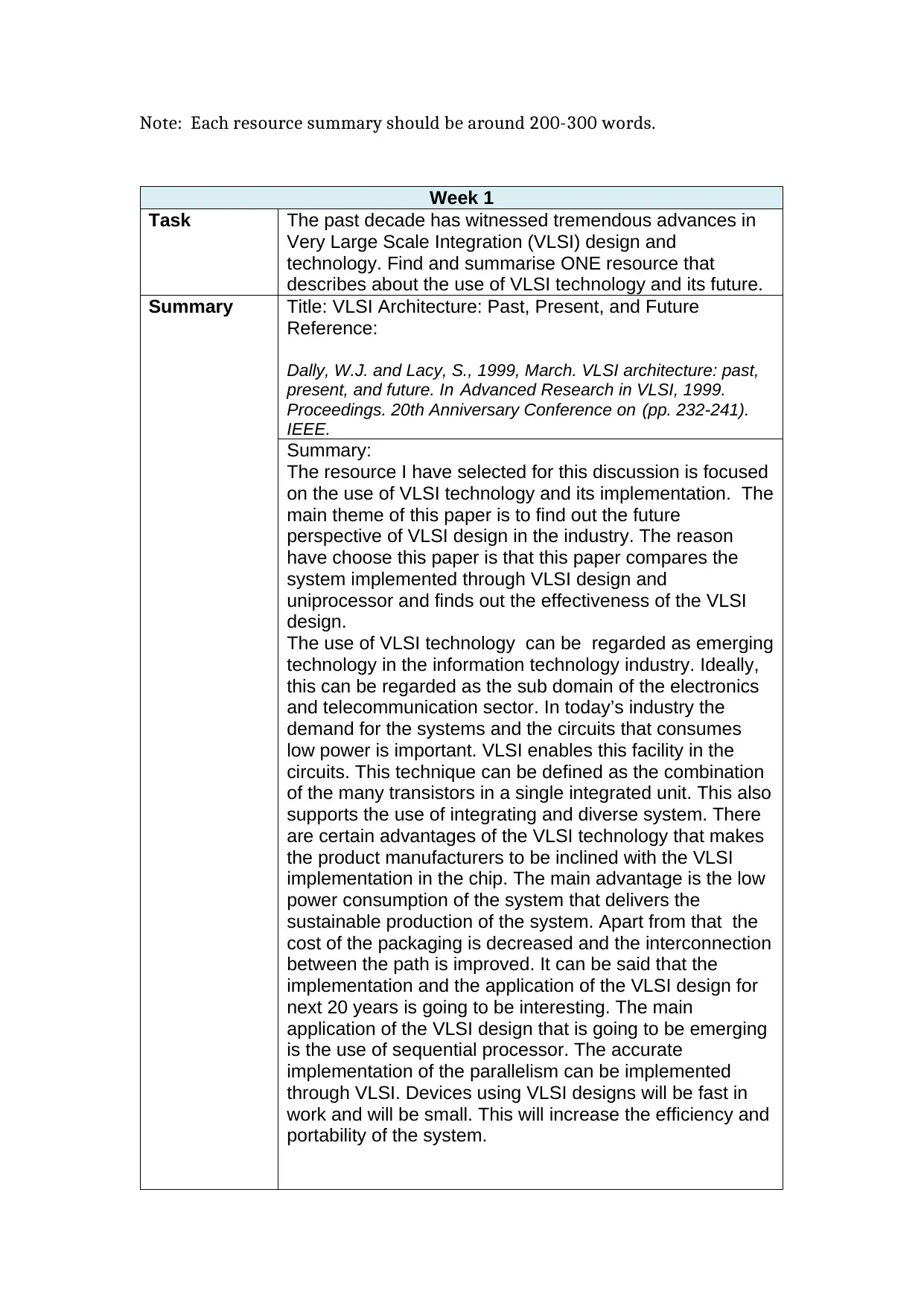
Note: Each resource summary should be around 200-300 words.
Week 1
Task The past decade has witnessed tremendous advances in
Very Large Scale Integration (VLSI) design and
technology. Find and summarise ONE resource that
describes about the use of VLSI technology and its future.
Summary Title: VLSI Architecture: Past, Present, and Future
Reference:
Dally, W.J. and Lacy, S., 1999, March. VLSI architecture: past,
present, and future. In Advanced Research in VLSI, 1999.
Proceedings. 20th Anniversary Conference on (pp. 232-241).
IEEE.
Summary:
The resource I have selected for this discussion is focused
on the use of VLSI technology and its implementation. The
main theme of this paper is to find out the future
perspective of VLSI design in the industry. The reason
have choose this paper is that this paper compares the
system implemented through VLSI design and
uniprocessor and finds out the effectiveness of the VLSI
design.
The use of VLSI technology can be regarded as emerging
technology in the information technology industry. Ideally,
this can be regarded as the sub domain of the electronics
and telecommunication sector. In today’s industry the
demand for the systems and the circuits that consumes
low power is important. VLSI enables this facility in the
circuits. This technique can be defined as the combination
of the many transistors in a single integrated unit. This also
supports the use of integrating and diverse system. There
are certain advantages of the VLSI technology that makes
the product manufacturers to be inclined with the VLSI
implementation in the chip. The main advantage is the low
power consumption of the system that delivers the
sustainable production of the system. Apart from that the
cost of the packaging is decreased and the interconnection
between the path is improved. It can be said that the
implementation and the application of the VLSI design for
next 20 years is going to be interesting. The main
application of the VLSI design that is going to be emerging
is the use of sequential processor. The accurate
implementation of the parallelism can be implemented
through VLSI. Devices using VLSI designs will be fast in
work and will be small. This will increase the efficiency and
portability of the system.
Week 1
Task The past decade has witnessed tremendous advances in
Very Large Scale Integration (VLSI) design and
technology. Find and summarise ONE resource that
describes about the use of VLSI technology and its future.
Summary Title: VLSI Architecture: Past, Present, and Future
Reference:
Dally, W.J. and Lacy, S., 1999, March. VLSI architecture: past,
present, and future. In Advanced Research in VLSI, 1999.
Proceedings. 20th Anniversary Conference on (pp. 232-241).
IEEE.
Summary:
The resource I have selected for this discussion is focused
on the use of VLSI technology and its implementation. The
main theme of this paper is to find out the future
perspective of VLSI design in the industry. The reason
have choose this paper is that this paper compares the
system implemented through VLSI design and
uniprocessor and finds out the effectiveness of the VLSI
design.
The use of VLSI technology can be regarded as emerging
technology in the information technology industry. Ideally,
this can be regarded as the sub domain of the electronics
and telecommunication sector. In today’s industry the
demand for the systems and the circuits that consumes
low power is important. VLSI enables this facility in the
circuits. This technique can be defined as the combination
of the many transistors in a single integrated unit. This also
supports the use of integrating and diverse system. There
are certain advantages of the VLSI technology that makes
the product manufacturers to be inclined with the VLSI
implementation in the chip. The main advantage is the low
power consumption of the system that delivers the
sustainable production of the system. Apart from that the
cost of the packaging is decreased and the interconnection
between the path is improved. It can be said that the
implementation and the application of the VLSI design for
next 20 years is going to be interesting. The main
application of the VLSI design that is going to be emerging
is the use of sequential processor. The accurate
implementation of the parallelism can be implemented
through VLSI. Devices using VLSI designs will be fast in
work and will be small. This will increase the efficiency and
portability of the system.
⊘ This is a preview!⊘
Do you want full access?
Subscribe today to unlock all pages.

Trusted by 1+ million students worldwide
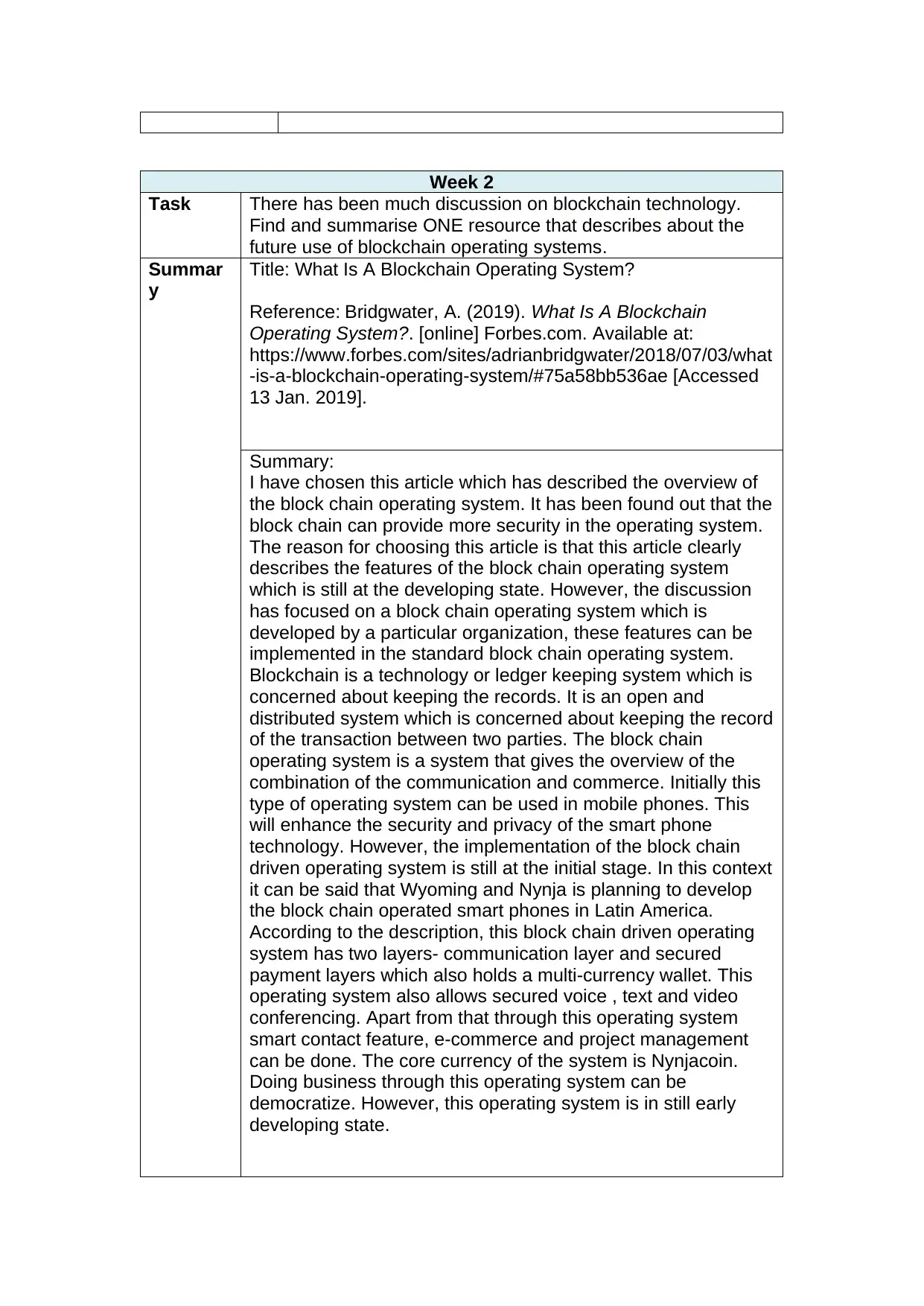
Week 2
Task There has been much discussion on blockchain technology.
Find and summarise ONE resource that describes about the
future use of blockchain operating systems.
Summar
y
Title: What Is A Blockchain Operating System?
Reference: Bridgwater, A. (2019). What Is A Blockchain
Operating System?. [online] Forbes.com. Available at:
https://www.forbes.com/sites/adrianbridgwater/2018/07/03/what
-is-a-blockchain-operating-system/#75a58bb536ae [Accessed
13 Jan. 2019].
Summary:
I have chosen this article which has described the overview of
the block chain operating system. It has been found out that the
block chain can provide more security in the operating system.
The reason for choosing this article is that this article clearly
describes the features of the block chain operating system
which is still at the developing state. However, the discussion
has focused on a block chain operating system which is
developed by a particular organization, these features can be
implemented in the standard block chain operating system.
Blockchain is a technology or ledger keeping system which is
concerned about keeping the records. It is an open and
distributed system which is concerned about keeping the record
of the transaction between two parties. The block chain
operating system is a system that gives the overview of the
combination of the communication and commerce. Initially this
type of operating system can be used in mobile phones. This
will enhance the security and privacy of the smart phone
technology. However, the implementation of the block chain
driven operating system is still at the initial stage. In this context
it can be said that Wyoming and Nynja is planning to develop
the block chain operated smart phones in Latin America.
According to the description, this block chain driven operating
system has two layers- communication layer and secured
payment layers which also holds a multi-currency wallet. This
operating system also allows secured voice , text and video
conferencing. Apart from that through this operating system
smart contact feature, e-commerce and project management
can be done. The core currency of the system is Nynjacoin.
Doing business through this operating system can be
democratize. However, this operating system is in still early
developing state.
Task There has been much discussion on blockchain technology.
Find and summarise ONE resource that describes about the
future use of blockchain operating systems.
Summar
y
Title: What Is A Blockchain Operating System?
Reference: Bridgwater, A. (2019). What Is A Blockchain
Operating System?. [online] Forbes.com. Available at:
https://www.forbes.com/sites/adrianbridgwater/2018/07/03/what
-is-a-blockchain-operating-system/#75a58bb536ae [Accessed
13 Jan. 2019].
Summary:
I have chosen this article which has described the overview of
the block chain operating system. It has been found out that the
block chain can provide more security in the operating system.
The reason for choosing this article is that this article clearly
describes the features of the block chain operating system
which is still at the developing state. However, the discussion
has focused on a block chain operating system which is
developed by a particular organization, these features can be
implemented in the standard block chain operating system.
Blockchain is a technology or ledger keeping system which is
concerned about keeping the records. It is an open and
distributed system which is concerned about keeping the record
of the transaction between two parties. The block chain
operating system is a system that gives the overview of the
combination of the communication and commerce. Initially this
type of operating system can be used in mobile phones. This
will enhance the security and privacy of the smart phone
technology. However, the implementation of the block chain
driven operating system is still at the initial stage. In this context
it can be said that Wyoming and Nynja is planning to develop
the block chain operated smart phones in Latin America.
According to the description, this block chain driven operating
system has two layers- communication layer and secured
payment layers which also holds a multi-currency wallet. This
operating system also allows secured voice , text and video
conferencing. Apart from that through this operating system
smart contact feature, e-commerce and project management
can be done. The core currency of the system is Nynjacoin.
Doing business through this operating system can be
democratize. However, this operating system is in still early
developing state.
Paraphrase This Document
Need a fresh take? Get an instant paraphrase of this document with our AI Paraphraser
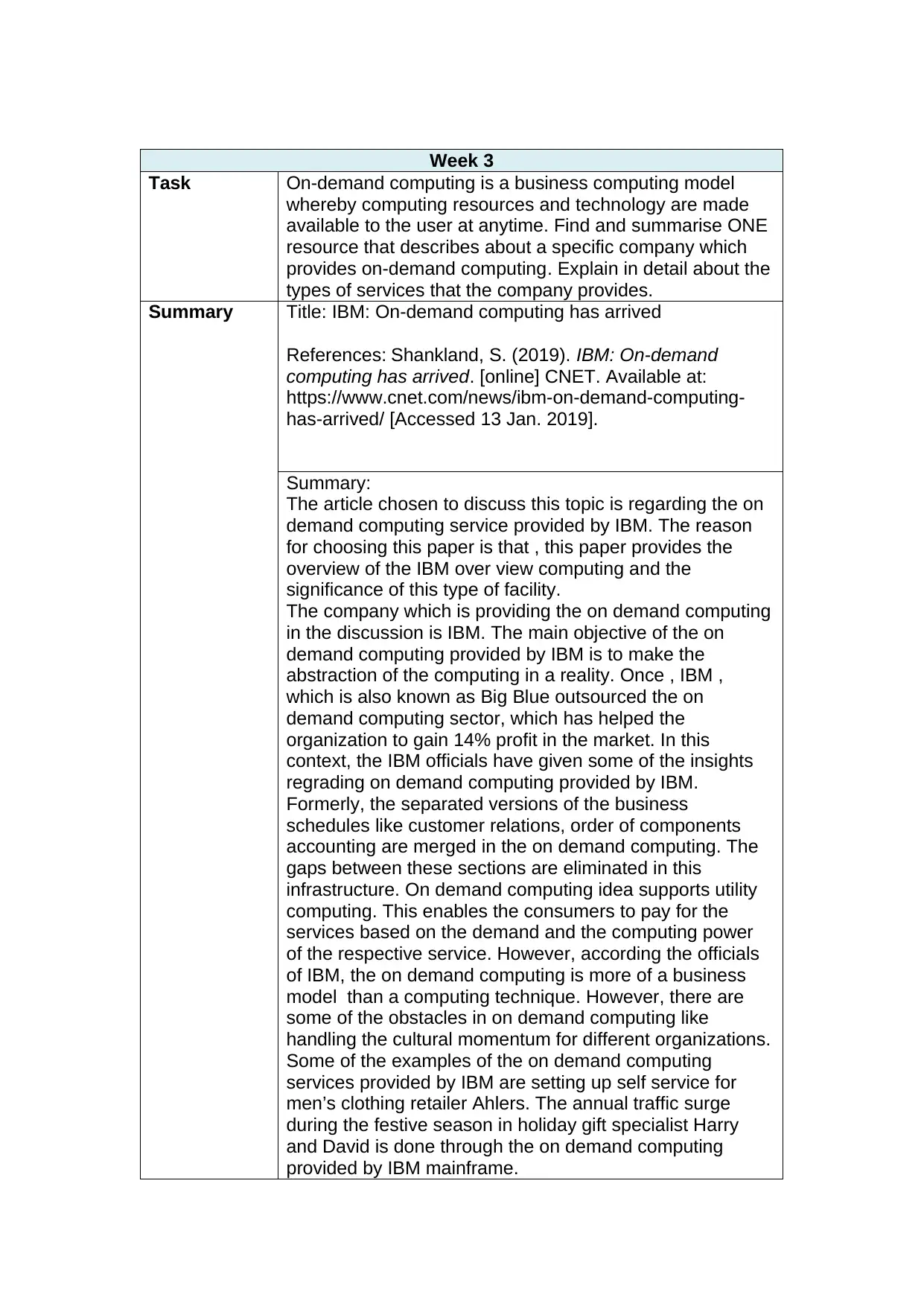
Week 3
Task On-demand computing is a business computing model
whereby computing resources and technology are made
available to the user at anytime. Find and summarise ONE
resource that describes about a specific company which
provides on-demand computing. Explain in detail about the
types of services that the company provides.
Summary Title: IBM: On-demand computing has arrived
References: Shankland, S. (2019). IBM: On-demand
computing has arrived. [online] CNET. Available at:
https://www.cnet.com/news/ibm-on-demand-computing-
has-arrived/ [Accessed 13 Jan. 2019].
Summary:
The article chosen to discuss this topic is regarding the on
demand computing service provided by IBM. The reason
for choosing this paper is that , this paper provides the
overview of the IBM over view computing and the
significance of this type of facility.
The company which is providing the on demand computing
in the discussion is IBM. The main objective of the on
demand computing provided by IBM is to make the
abstraction of the computing in a reality. Once , IBM ,
which is also known as Big Blue outsourced the on
demand computing sector, which has helped the
organization to gain 14% profit in the market. In this
context, the IBM officials have given some of the insights
regrading on demand computing provided by IBM.
Formerly, the separated versions of the business
schedules like customer relations, order of components
accounting are merged in the on demand computing. The
gaps between these sections are eliminated in this
infrastructure. On demand computing idea supports utility
computing. This enables the consumers to pay for the
services based on the demand and the computing power
of the respective service. However, according the officials
of IBM, the on demand computing is more of a business
model than a computing technique. However, there are
some of the obstacles in on demand computing like
handling the cultural momentum for different organizations.
Some of the examples of the on demand computing
services provided by IBM are setting up self service for
men’s clothing retailer Ahlers. The annual traffic surge
during the festive season in holiday gift specialist Harry
and David is done through the on demand computing
provided by IBM mainframe.
Task On-demand computing is a business computing model
whereby computing resources and technology are made
available to the user at anytime. Find and summarise ONE
resource that describes about a specific company which
provides on-demand computing. Explain in detail about the
types of services that the company provides.
Summary Title: IBM: On-demand computing has arrived
References: Shankland, S. (2019). IBM: On-demand
computing has arrived. [online] CNET. Available at:
https://www.cnet.com/news/ibm-on-demand-computing-
has-arrived/ [Accessed 13 Jan. 2019].
Summary:
The article chosen to discuss this topic is regarding the on
demand computing service provided by IBM. The reason
for choosing this paper is that , this paper provides the
overview of the IBM over view computing and the
significance of this type of facility.
The company which is providing the on demand computing
in the discussion is IBM. The main objective of the on
demand computing provided by IBM is to make the
abstraction of the computing in a reality. Once , IBM ,
which is also known as Big Blue outsourced the on
demand computing sector, which has helped the
organization to gain 14% profit in the market. In this
context, the IBM officials have given some of the insights
regrading on demand computing provided by IBM.
Formerly, the separated versions of the business
schedules like customer relations, order of components
accounting are merged in the on demand computing. The
gaps between these sections are eliminated in this
infrastructure. On demand computing idea supports utility
computing. This enables the consumers to pay for the
services based on the demand and the computing power
of the respective service. However, according the officials
of IBM, the on demand computing is more of a business
model than a computing technique. However, there are
some of the obstacles in on demand computing like
handling the cultural momentum for different organizations.
Some of the examples of the on demand computing
services provided by IBM are setting up self service for
men’s clothing retailer Ahlers. The annual traffic surge
during the festive season in holiday gift specialist Harry
and David is done through the on demand computing
provided by IBM mainframe.
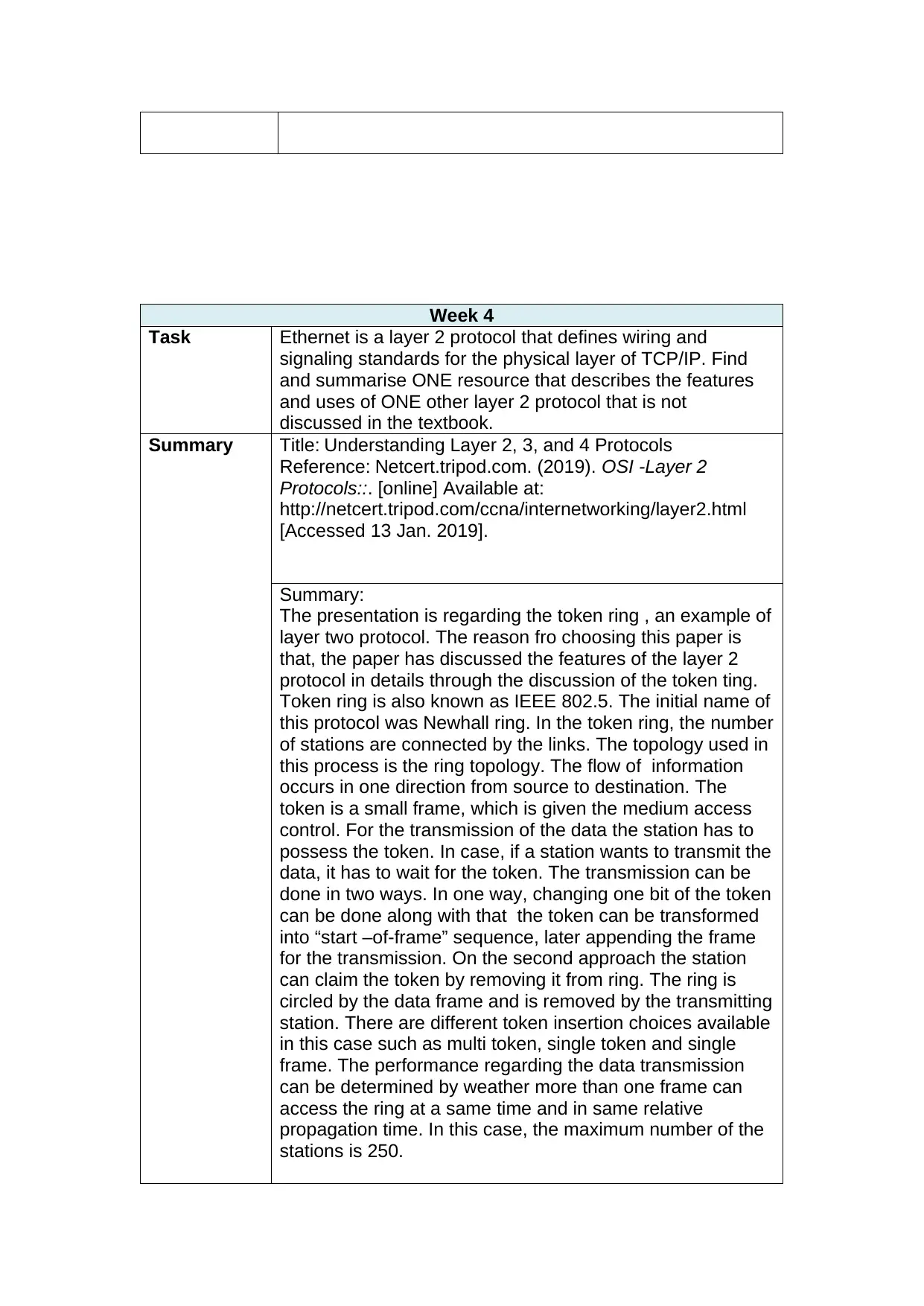
Week 4
Task Ethernet is a layer 2 protocol that defines wiring and
signaling standards for the physical layer of TCP/IP. Find
and summarise ONE resource that describes the features
and uses of ONE other layer 2 protocol that is not
discussed in the textbook.
Summary Title: Understanding Layer 2, 3, and 4 Protocols
Reference: Netcert.tripod.com. (2019). OSI -Layer 2
Protocols::. [online] Available at:
http://netcert.tripod.com/ccna/internetworking/layer2.html
[Accessed 13 Jan. 2019].
Summary:
The presentation is regarding the token ring , an example of
layer two protocol. The reason fro choosing this paper is
that, the paper has discussed the features of the layer 2
protocol in details through the discussion of the token ting.
Token ring is also known as IEEE 802.5. The initial name of
this protocol was Newhall ring. In the token ring, the number
of stations are connected by the links. The topology used in
this process is the ring topology. The flow of information
occurs in one direction from source to destination. The
token is a small frame, which is given the medium access
control. For the transmission of the data the station has to
possess the token. In case, if a station wants to transmit the
data, it has to wait for the token. The transmission can be
done in two ways. In one way, changing one bit of the token
can be done along with that the token can be transformed
into “start –of-frame” sequence, later appending the frame
for the transmission. On the second approach the station
can claim the token by removing it from ring. The ring is
circled by the data frame and is removed by the transmitting
station. There are different token insertion choices available
in this case such as multi token, single token and single
frame. The performance regarding the data transmission
can be determined by weather more than one frame can
access the ring at a same time and in same relative
propagation time. In this case, the maximum number of the
stations is 250.
Task Ethernet is a layer 2 protocol that defines wiring and
signaling standards for the physical layer of TCP/IP. Find
and summarise ONE resource that describes the features
and uses of ONE other layer 2 protocol that is not
discussed in the textbook.
Summary Title: Understanding Layer 2, 3, and 4 Protocols
Reference: Netcert.tripod.com. (2019). OSI -Layer 2
Protocols::. [online] Available at:
http://netcert.tripod.com/ccna/internetworking/layer2.html
[Accessed 13 Jan. 2019].
Summary:
The presentation is regarding the token ring , an example of
layer two protocol. The reason fro choosing this paper is
that, the paper has discussed the features of the layer 2
protocol in details through the discussion of the token ting.
Token ring is also known as IEEE 802.5. The initial name of
this protocol was Newhall ring. In the token ring, the number
of stations are connected by the links. The topology used in
this process is the ring topology. The flow of information
occurs in one direction from source to destination. The
token is a small frame, which is given the medium access
control. For the transmission of the data the station has to
possess the token. In case, if a station wants to transmit the
data, it has to wait for the token. The transmission can be
done in two ways. In one way, changing one bit of the token
can be done along with that the token can be transformed
into “start –of-frame” sequence, later appending the frame
for the transmission. On the second approach the station
can claim the token by removing it from ring. The ring is
circled by the data frame and is removed by the transmitting
station. There are different token insertion choices available
in this case such as multi token, single token and single
frame. The performance regarding the data transmission
can be determined by weather more than one frame can
access the ring at a same time and in same relative
propagation time. In this case, the maximum number of the
stations is 250.
⊘ This is a preview!⊘
Do you want full access?
Subscribe today to unlock all pages.

Trusted by 1+ million students worldwide
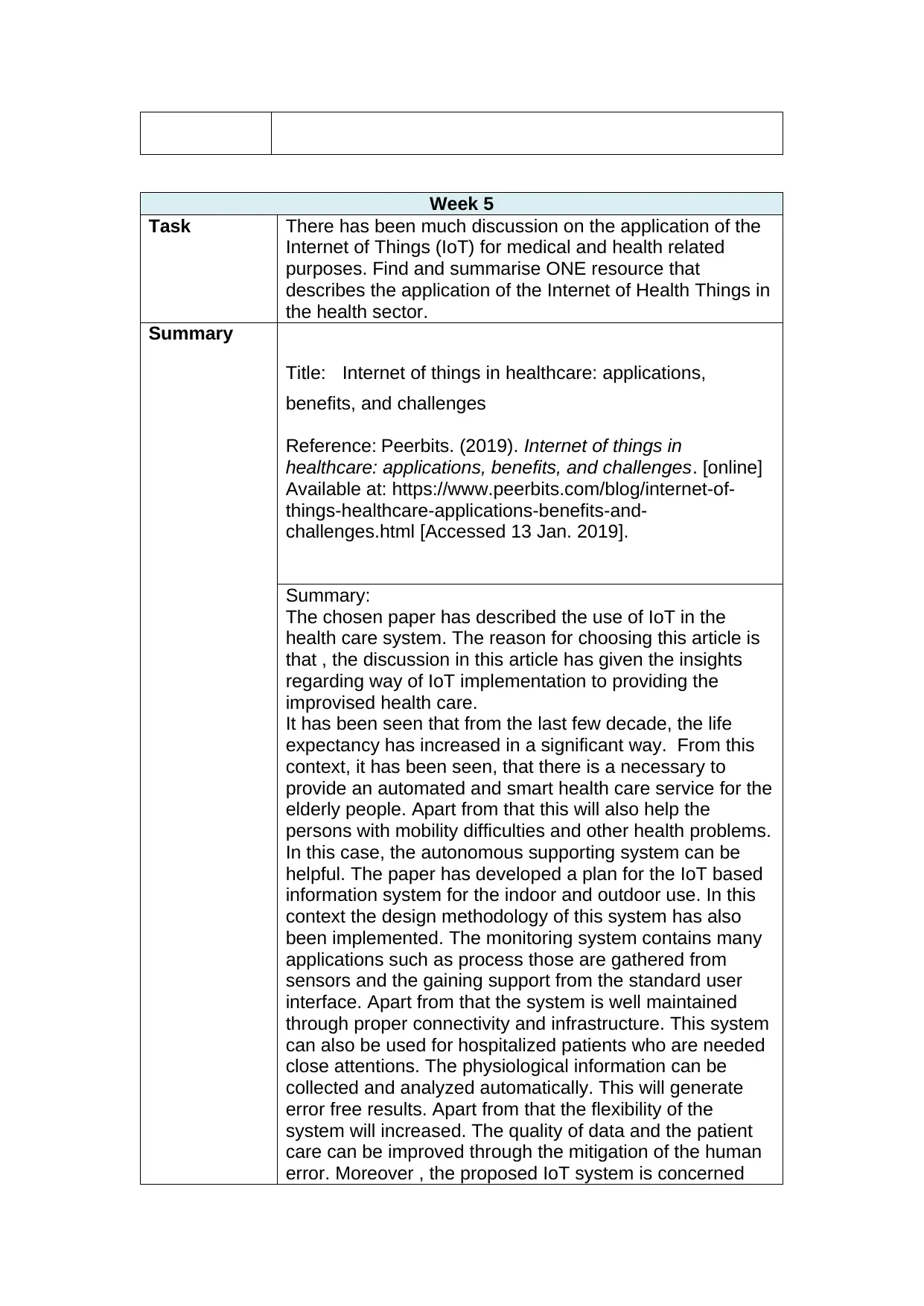
Week 5
Task There has been much discussion on the application of the
Internet of Things (IoT) for medical and health related
purposes. Find and summarise ONE resource that
describes the application of the Internet of Health Things in
the health sector.
Summary
Title: Internet of things in healthcare: applications,
benefits, and challenges
Reference: Peerbits. (2019). Internet of things in
healthcare: applications, benefits, and challenges. [online]
Available at: https://www.peerbits.com/blog/internet-of-
things-healthcare-applications-benefits-and-
challenges.html [Accessed 13 Jan. 2019].
Summary:
The chosen paper has described the use of IoT in the
health care system. The reason for choosing this article is
that , the discussion in this article has given the insights
regarding way of IoT implementation to providing the
improvised health care.
It has been seen that from the last few decade, the life
expectancy has increased in a significant way. From this
context, it has been seen, that there is a necessary to
provide an automated and smart health care service for the
elderly people. Apart from that this will also help the
persons with mobility difficulties and other health problems.
In this case, the autonomous supporting system can be
helpful. The paper has developed a plan for the IoT based
information system for the indoor and outdoor use. In this
context the design methodology of this system has also
been implemented. The monitoring system contains many
applications such as process those are gathered from
sensors and the gaining support from the standard user
interface. Apart from that the system is well maintained
through proper connectivity and infrastructure. This system
can also be used for hospitalized patients who are needed
close attentions. The physiological information can be
collected and analyzed automatically. This will generate
error free results. Apart from that the flexibility of the
system will increased. The quality of data and the patient
care can be improved through the mitigation of the human
error. Moreover , the proposed IoT system is concerned
Task There has been much discussion on the application of the
Internet of Things (IoT) for medical and health related
purposes. Find and summarise ONE resource that
describes the application of the Internet of Health Things in
the health sector.
Summary
Title: Internet of things in healthcare: applications,
benefits, and challenges
Reference: Peerbits. (2019). Internet of things in
healthcare: applications, benefits, and challenges. [online]
Available at: https://www.peerbits.com/blog/internet-of-
things-healthcare-applications-benefits-and-
challenges.html [Accessed 13 Jan. 2019].
Summary:
The chosen paper has described the use of IoT in the
health care system. The reason for choosing this article is
that , the discussion in this article has given the insights
regarding way of IoT implementation to providing the
improvised health care.
It has been seen that from the last few decade, the life
expectancy has increased in a significant way. From this
context, it has been seen, that there is a necessary to
provide an automated and smart health care service for the
elderly people. Apart from that this will also help the
persons with mobility difficulties and other health problems.
In this case, the autonomous supporting system can be
helpful. The paper has developed a plan for the IoT based
information system for the indoor and outdoor use. In this
context the design methodology of this system has also
been implemented. The monitoring system contains many
applications such as process those are gathered from
sensors and the gaining support from the standard user
interface. Apart from that the system is well maintained
through proper connectivity and infrastructure. This system
can also be used for hospitalized patients who are needed
close attentions. The physiological information can be
collected and analyzed automatically. This will generate
error free results. Apart from that the flexibility of the
system will increased. The quality of data and the patient
care can be improved through the mitigation of the human
error. Moreover , the proposed IoT system is concerned
Paraphrase This Document
Need a fresh take? Get an instant paraphrase of this document with our AI Paraphraser
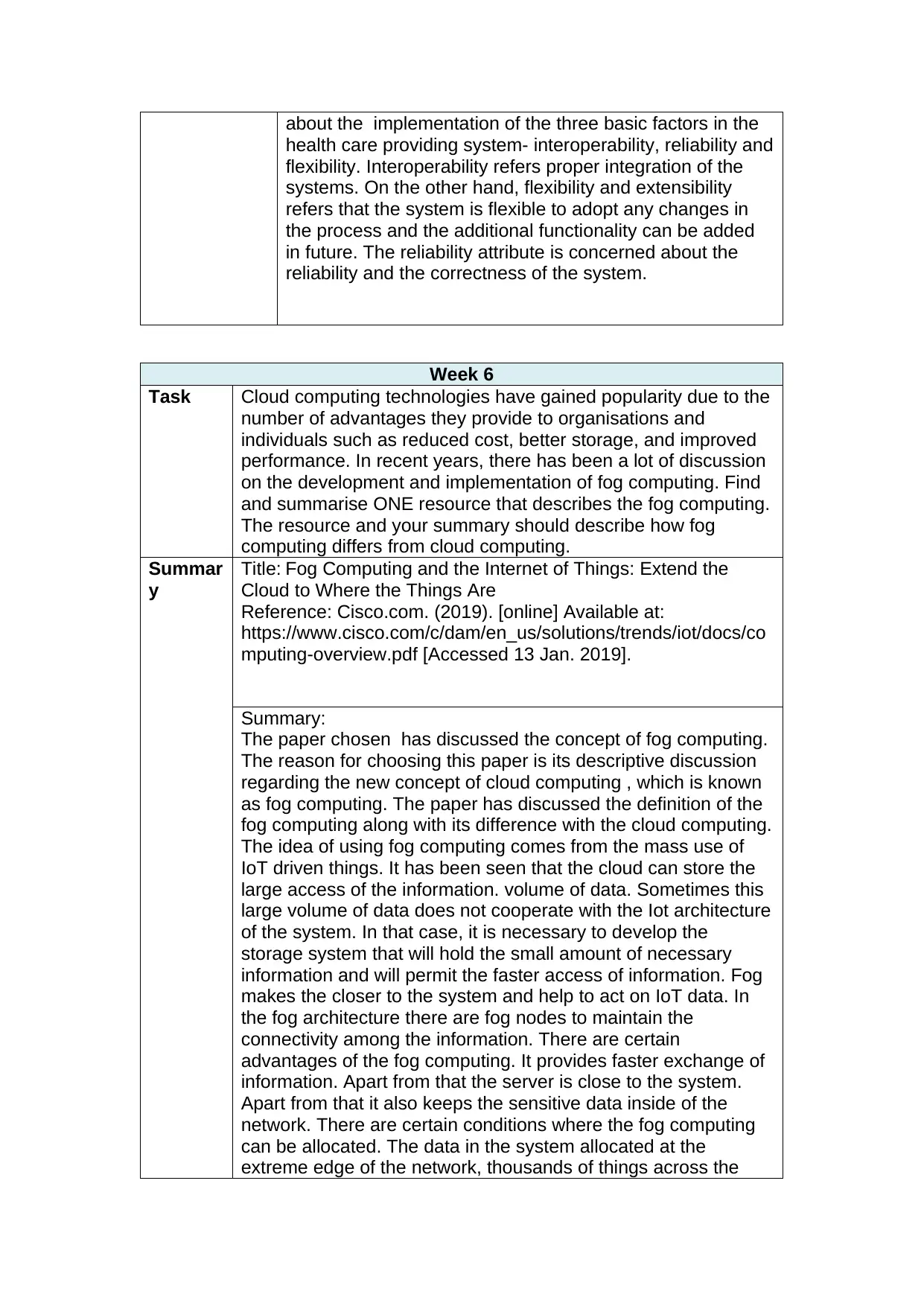
about the implementation of the three basic factors in the
health care providing system- interoperability, reliability and
flexibility. Interoperability refers proper integration of the
systems. On the other hand, flexibility and extensibility
refers that the system is flexible to adopt any changes in
the process and the additional functionality can be added
in future. The reliability attribute is concerned about the
reliability and the correctness of the system.
Week 6
Task Cloud computing technologies have gained popularity due to the
number of advantages they provide to organisations and
individuals such as reduced cost, better storage, and improved
performance. In recent years, there has been a lot of discussion
on the development and implementation of fog computing. Find
and summarise ONE resource that describes the fog computing.
The resource and your summary should describe how fog
computing differs from cloud computing.
Summar
y
Title: Fog Computing and the Internet of Things: Extend the
Cloud to Where the Things Are
Reference: Cisco.com. (2019). [online] Available at:
https://www.cisco.com/c/dam/en_us/solutions/trends/iot/docs/co
mputing-overview.pdf [Accessed 13 Jan. 2019].
Summary:
The paper chosen has discussed the concept of fog computing.
The reason for choosing this paper is its descriptive discussion
regarding the new concept of cloud computing , which is known
as fog computing. The paper has discussed the definition of the
fog computing along with its difference with the cloud computing.
The idea of using fog computing comes from the mass use of
IoT driven things. It has been seen that the cloud can store the
large access of the information. volume of data. Sometimes this
large volume of data does not cooperate with the Iot architecture
of the system. In that case, it is necessary to develop the
storage system that will hold the small amount of necessary
information and will permit the faster access of information. Fog
makes the closer to the system and help to act on IoT data. In
the fog architecture there are fog nodes to maintain the
connectivity among the information. There are certain
advantages of the fog computing. It provides faster exchange of
information. Apart from that the server is close to the system.
Apart from that it also keeps the sensitive data inside of the
network. There are certain conditions where the fog computing
can be allocated. The data in the system allocated at the
extreme edge of the network, thousands of things across the
health care providing system- interoperability, reliability and
flexibility. Interoperability refers proper integration of the
systems. On the other hand, flexibility and extensibility
refers that the system is flexible to adopt any changes in
the process and the additional functionality can be added
in future. The reliability attribute is concerned about the
reliability and the correctness of the system.
Week 6
Task Cloud computing technologies have gained popularity due to the
number of advantages they provide to organisations and
individuals such as reduced cost, better storage, and improved
performance. In recent years, there has been a lot of discussion
on the development and implementation of fog computing. Find
and summarise ONE resource that describes the fog computing.
The resource and your summary should describe how fog
computing differs from cloud computing.
Summar
y
Title: Fog Computing and the Internet of Things: Extend the
Cloud to Where the Things Are
Reference: Cisco.com. (2019). [online] Available at:
https://www.cisco.com/c/dam/en_us/solutions/trends/iot/docs/co
mputing-overview.pdf [Accessed 13 Jan. 2019].
Summary:
The paper chosen has discussed the concept of fog computing.
The reason for choosing this paper is its descriptive discussion
regarding the new concept of cloud computing , which is known
as fog computing. The paper has discussed the definition of the
fog computing along with its difference with the cloud computing.
The idea of using fog computing comes from the mass use of
IoT driven things. It has been seen that the cloud can store the
large access of the information. volume of data. Sometimes this
large volume of data does not cooperate with the Iot architecture
of the system. In that case, it is necessary to develop the
storage system that will hold the small amount of necessary
information and will permit the faster access of information. Fog
makes the closer to the system and help to act on IoT data. In
the fog architecture there are fog nodes to maintain the
connectivity among the information. There are certain
advantages of the fog computing. It provides faster exchange of
information. Apart from that the server is close to the system.
Apart from that it also keeps the sensitive data inside of the
network. There are certain conditions where the fog computing
can be allocated. The data in the system allocated at the
extreme edge of the network, thousands of things across the
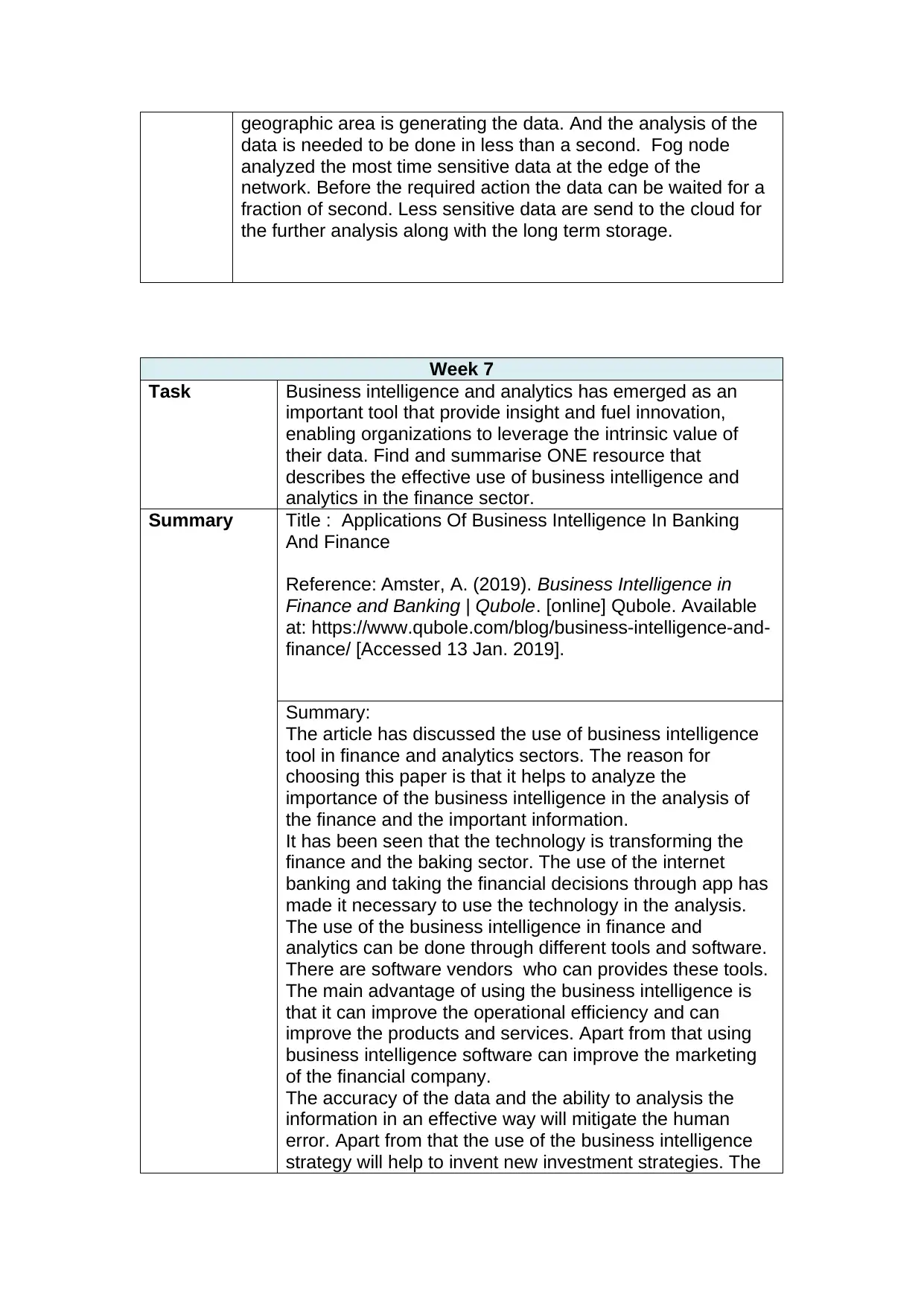
geographic area is generating the data. And the analysis of the
data is needed to be done in less than a second. Fog node
analyzed the most time sensitive data at the edge of the
network. Before the required action the data can be waited for a
fraction of second. Less sensitive data are send to the cloud for
the further analysis along with the long term storage.
Week 7
Task Business intelligence and analytics has emerged as an
important tool that provide insight and fuel innovation,
enabling organizations to leverage the intrinsic value of
their data. Find and summarise ONE resource that
describes the effective use of business intelligence and
analytics in the finance sector.
Summary Title : Applications Of Business Intelligence In Banking
And Finance
Reference: Amster, A. (2019). Business Intelligence in
Finance and Banking | Qubole. [online] Qubole. Available
at: https://www.qubole.com/blog/business-intelligence-and-
finance/ [Accessed 13 Jan. 2019].
Summary:
The article has discussed the use of business intelligence
tool in finance and analytics sectors. The reason for
choosing this paper is that it helps to analyze the
importance of the business intelligence in the analysis of
the finance and the important information.
It has been seen that the technology is transforming the
finance and the baking sector. The use of the internet
banking and taking the financial decisions through app has
made it necessary to use the technology in the analysis.
The use of the business intelligence in finance and
analytics can be done through different tools and software.
There are software vendors who can provides these tools.
The main advantage of using the business intelligence is
that it can improve the operational efficiency and can
improve the products and services. Apart from that using
business intelligence software can improve the marketing
of the financial company.
The accuracy of the data and the ability to analysis the
information in an effective way will mitigate the human
error. Apart from that the use of the business intelligence
strategy will help to invent new investment strategies. The
data is needed to be done in less than a second. Fog node
analyzed the most time sensitive data at the edge of the
network. Before the required action the data can be waited for a
fraction of second. Less sensitive data are send to the cloud for
the further analysis along with the long term storage.
Week 7
Task Business intelligence and analytics has emerged as an
important tool that provide insight and fuel innovation,
enabling organizations to leverage the intrinsic value of
their data. Find and summarise ONE resource that
describes the effective use of business intelligence and
analytics in the finance sector.
Summary Title : Applications Of Business Intelligence In Banking
And Finance
Reference: Amster, A. (2019). Business Intelligence in
Finance and Banking | Qubole. [online] Qubole. Available
at: https://www.qubole.com/blog/business-intelligence-and-
finance/ [Accessed 13 Jan. 2019].
Summary:
The article has discussed the use of business intelligence
tool in finance and analytics sectors. The reason for
choosing this paper is that it helps to analyze the
importance of the business intelligence in the analysis of
the finance and the important information.
It has been seen that the technology is transforming the
finance and the baking sector. The use of the internet
banking and taking the financial decisions through app has
made it necessary to use the technology in the analysis.
The use of the business intelligence in finance and
analytics can be done through different tools and software.
There are software vendors who can provides these tools.
The main advantage of using the business intelligence is
that it can improve the operational efficiency and can
improve the products and services. Apart from that using
business intelligence software can improve the marketing
of the financial company.
The accuracy of the data and the ability to analysis the
information in an effective way will mitigate the human
error. Apart from that the use of the business intelligence
strategy will help to invent new investment strategies. The
⊘ This is a preview!⊘
Do you want full access?
Subscribe today to unlock all pages.

Trusted by 1+ million students worldwide
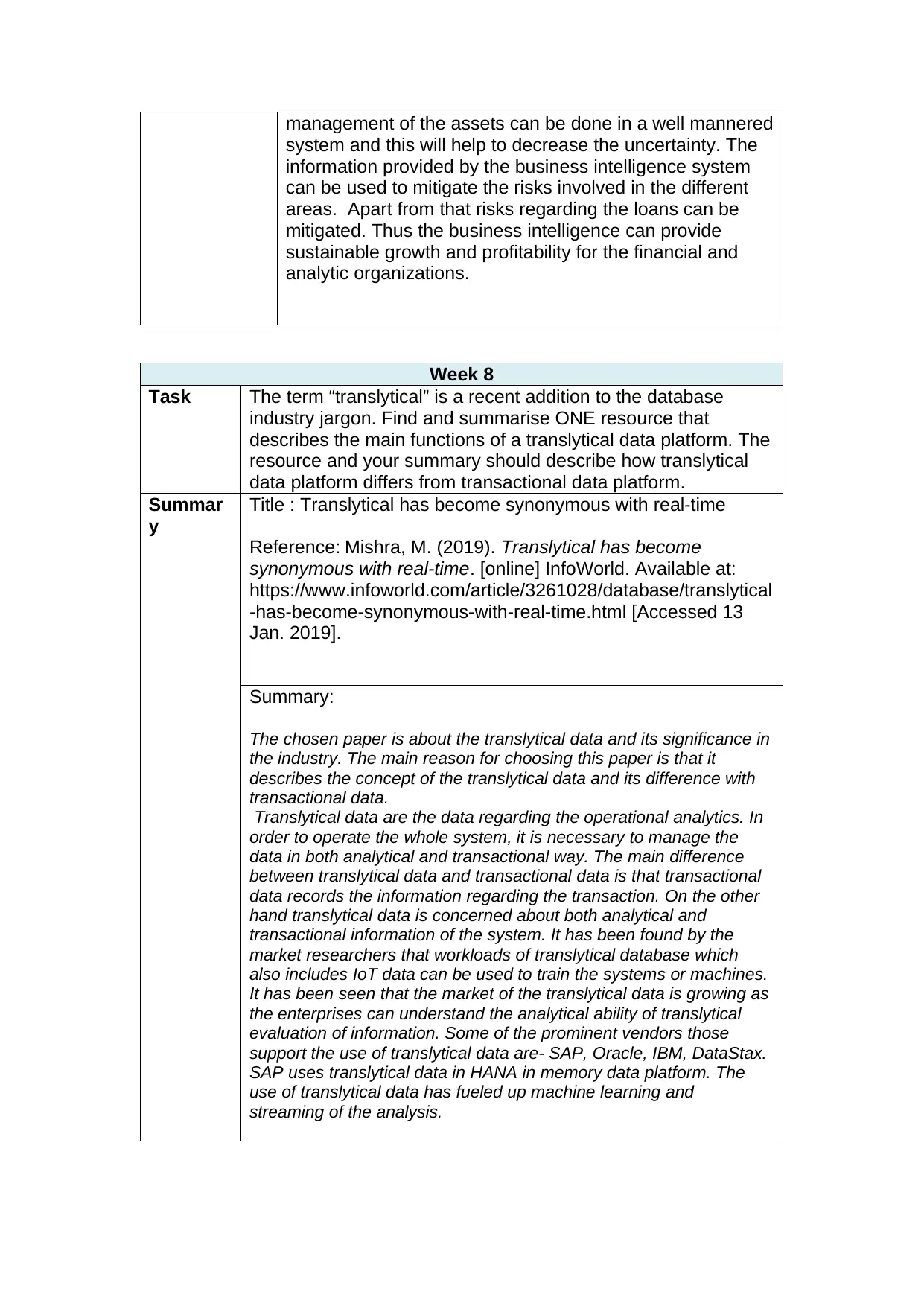
management of the assets can be done in a well mannered
system and this will help to decrease the uncertainty. The
information provided by the business intelligence system
can be used to mitigate the risks involved in the different
areas. Apart from that risks regarding the loans can be
mitigated. Thus the business intelligence can provide
sustainable growth and profitability for the financial and
analytic organizations.
Week 8
Task The term “translytical” is a recent addition to the database
industry jargon. Find and summarise ONE resource that
describes the main functions of a translytical data platform. The
resource and your summary should describe how translytical
data platform differs from transactional data platform.
Summar
y
Title : Translytical has become synonymous with real-time
Reference: Mishra, M. (2019). Translytical has become
synonymous with real-time. [online] InfoWorld. Available at:
https://www.infoworld.com/article/3261028/database/translytical
-has-become-synonymous-with-real-time.html [Accessed 13
Jan. 2019].
Summary:
The chosen paper is about the translytical data and its significance in
the industry. The main reason for choosing this paper is that it
describes the concept of the translytical data and its difference with
transactional data.
Translytical data are the data regarding the operational analytics. In
order to operate the whole system, it is necessary to manage the
data in both analytical and transactional way. The main difference
between translytical data and transactional data is that transactional
data records the information regarding the transaction. On the other
hand translytical data is concerned about both analytical and
transactional information of the system. It has been found by the
market researchers that workloads of translytical database which
also includes IoT data can be used to train the systems or machines.
It has been seen that the market of the translytical data is growing as
the enterprises can understand the analytical ability of translytical
evaluation of information. Some of the prominent vendors those
support the use of translytical data are- SAP, Oracle, IBM, DataStax.
SAP uses translytical data in HANA in memory data platform. The
use of translytical data has fueled up machine learning and
streaming of the analysis.
system and this will help to decrease the uncertainty. The
information provided by the business intelligence system
can be used to mitigate the risks involved in the different
areas. Apart from that risks regarding the loans can be
mitigated. Thus the business intelligence can provide
sustainable growth and profitability for the financial and
analytic organizations.
Week 8
Task The term “translytical” is a recent addition to the database
industry jargon. Find and summarise ONE resource that
describes the main functions of a translytical data platform. The
resource and your summary should describe how translytical
data platform differs from transactional data platform.
Summar
y
Title : Translytical has become synonymous with real-time
Reference: Mishra, M. (2019). Translytical has become
synonymous with real-time. [online] InfoWorld. Available at:
https://www.infoworld.com/article/3261028/database/translytical
-has-become-synonymous-with-real-time.html [Accessed 13
Jan. 2019].
Summary:
The chosen paper is about the translytical data and its significance in
the industry. The main reason for choosing this paper is that it
describes the concept of the translytical data and its difference with
transactional data.
Translytical data are the data regarding the operational analytics. In
order to operate the whole system, it is necessary to manage the
data in both analytical and transactional way. The main difference
between translytical data and transactional data is that transactional
data records the information regarding the transaction. On the other
hand translytical data is concerned about both analytical and
transactional information of the system. It has been found by the
market researchers that workloads of translytical database which
also includes IoT data can be used to train the systems or machines.
It has been seen that the market of the translytical data is growing as
the enterprises can understand the analytical ability of translytical
evaluation of information. Some of the prominent vendors those
support the use of translytical data are- SAP, Oracle, IBM, DataStax.
SAP uses translytical data in HANA in memory data platform. The
use of translytical data has fueled up machine learning and
streaming of the analysis.
Paraphrase This Document
Need a fresh take? Get an instant paraphrase of this document with our AI Paraphraser
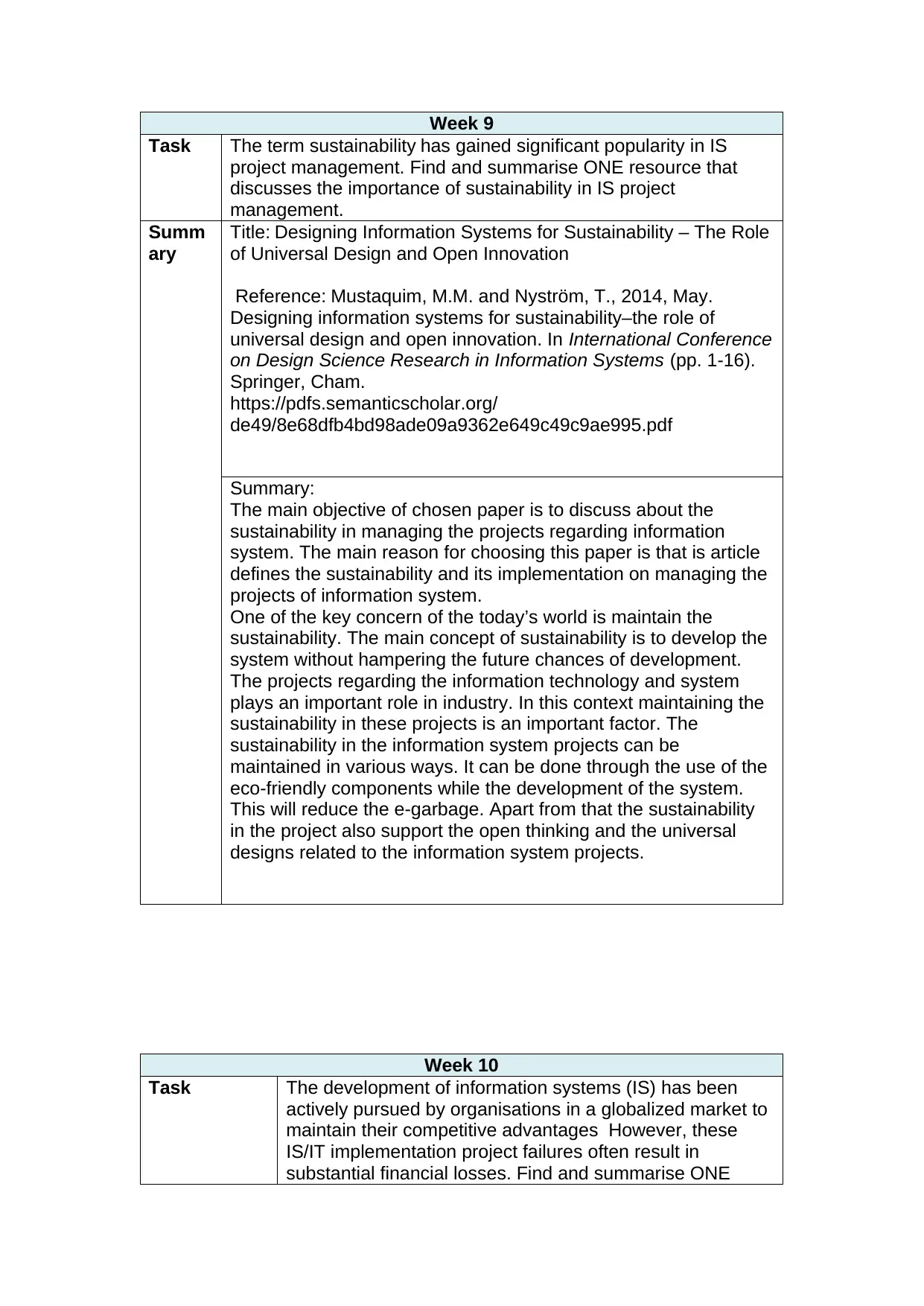
Week 9
Task The term sustainability has gained significant popularity in IS
project management. Find and summarise ONE resource that
discusses the importance of sustainability in IS project
management.
Summ
ary
Title: Designing Information Systems for Sustainability – The Role
of Universal Design and Open Innovation
Reference: Mustaquim, M.M. and Nyström, T., 2014, May.
Designing information systems for sustainability–the role of
universal design and open innovation. In International Conference
on Design Science Research in Information Systems (pp. 1-16).
Springer, Cham.
https://pdfs.semanticscholar.org/
de49/8e68dfb4bd98ade09a9362e649c49c9ae995.pdf
Summary:
The main objective of chosen paper is to discuss about the
sustainability in managing the projects regarding information
system. The main reason for choosing this paper is that is article
defines the sustainability and its implementation on managing the
projects of information system.
One of the key concern of the today’s world is maintain the
sustainability. The main concept of sustainability is to develop the
system without hampering the future chances of development.
The projects regarding the information technology and system
plays an important role in industry. In this context maintaining the
sustainability in these projects is an important factor. The
sustainability in the information system projects can be
maintained in various ways. It can be done through the use of the
eco-friendly components while the development of the system.
This will reduce the e-garbage. Apart from that the sustainability
in the project also support the open thinking and the universal
designs related to the information system projects.
Week 10
Task The development of information systems (IS) has been
actively pursued by organisations in a globalized market to
maintain their competitive advantages However, these
IS/IT implementation project failures often result in
substantial financial losses. Find and summarise ONE
Task The term sustainability has gained significant popularity in IS
project management. Find and summarise ONE resource that
discusses the importance of sustainability in IS project
management.
Summ
ary
Title: Designing Information Systems for Sustainability – The Role
of Universal Design and Open Innovation
Reference: Mustaquim, M.M. and Nyström, T., 2014, May.
Designing information systems for sustainability–the role of
universal design and open innovation. In International Conference
on Design Science Research in Information Systems (pp. 1-16).
Springer, Cham.
https://pdfs.semanticscholar.org/
de49/8e68dfb4bd98ade09a9362e649c49c9ae995.pdf
Summary:
The main objective of chosen paper is to discuss about the
sustainability in managing the projects regarding information
system. The main reason for choosing this paper is that is article
defines the sustainability and its implementation on managing the
projects of information system.
One of the key concern of the today’s world is maintain the
sustainability. The main concept of sustainability is to develop the
system without hampering the future chances of development.
The projects regarding the information technology and system
plays an important role in industry. In this context maintaining the
sustainability in these projects is an important factor. The
sustainability in the information system projects can be
maintained in various ways. It can be done through the use of the
eco-friendly components while the development of the system.
This will reduce the e-garbage. Apart from that the sustainability
in the project also support the open thinking and the universal
designs related to the information system projects.
Week 10
Task The development of information systems (IS) has been
actively pursued by organisations in a globalized market to
maintain their competitive advantages However, these
IS/IT implementation project failures often result in
substantial financial losses. Find and summarise ONE
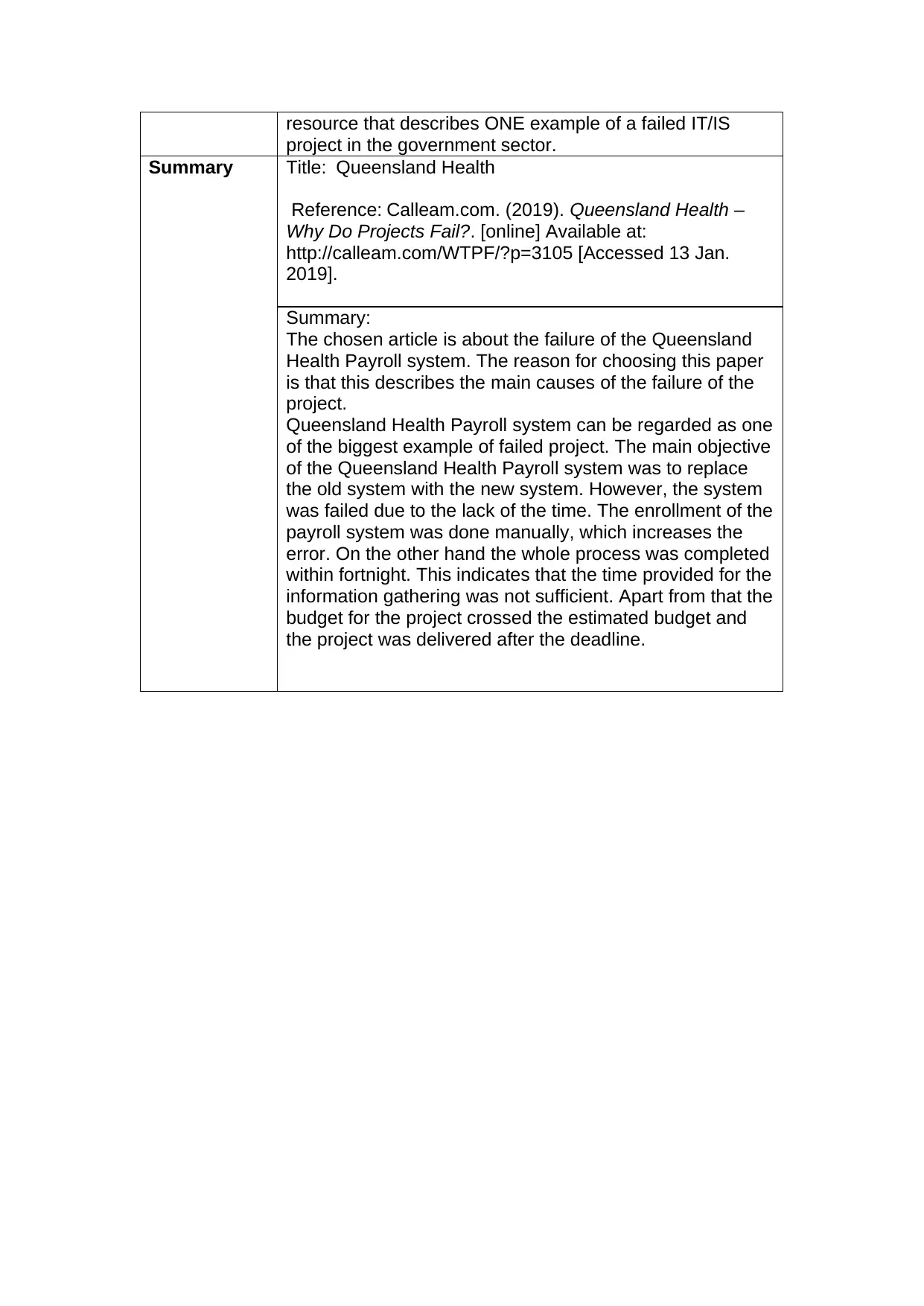
resource that describes ONE example of a failed IT/IS
project in the government sector.
Summary Title: Queensland Health
Reference: Calleam.com. (2019). Queensland Health –
Why Do Projects Fail?. [online] Available at:
http://calleam.com/WTPF/?p=3105 [Accessed 13 Jan.
2019].
Summary:
The chosen article is about the failure of the Queensland
Health Payroll system. The reason for choosing this paper
is that this describes the main causes of the failure of the
project.
Queensland Health Payroll system can be regarded as one
of the biggest example of failed project. The main objective
of the Queensland Health Payroll system was to replace
the old system with the new system. However, the system
was failed due to the lack of the time. The enrollment of the
payroll system was done manually, which increases the
error. On the other hand the whole process was completed
within fortnight. This indicates that the time provided for the
information gathering was not sufficient. Apart from that the
budget for the project crossed the estimated budget and
the project was delivered after the deadline.
project in the government sector.
Summary Title: Queensland Health
Reference: Calleam.com. (2019). Queensland Health –
Why Do Projects Fail?. [online] Available at:
http://calleam.com/WTPF/?p=3105 [Accessed 13 Jan.
2019].
Summary:
The chosen article is about the failure of the Queensland
Health Payroll system. The reason for choosing this paper
is that this describes the main causes of the failure of the
project.
Queensland Health Payroll system can be regarded as one
of the biggest example of failed project. The main objective
of the Queensland Health Payroll system was to replace
the old system with the new system. However, the system
was failed due to the lack of the time. The enrollment of the
payroll system was done manually, which increases the
error. On the other hand the whole process was completed
within fortnight. This indicates that the time provided for the
information gathering was not sufficient. Apart from that the
budget for the project crossed the estimated budget and
the project was delivered after the deadline.
⊘ This is a preview!⊘
Do you want full access?
Subscribe today to unlock all pages.

Trusted by 1+ million students worldwide
1 out of 13
Related Documents
Your All-in-One AI-Powered Toolkit for Academic Success.
+13062052269
info@desklib.com
Available 24*7 on WhatsApp / Email
![[object Object]](/_next/static/media/star-bottom.7253800d.svg)
Unlock your academic potential
Copyright © 2020–2026 A2Z Services. All Rights Reserved. Developed and managed by ZUCOL.




